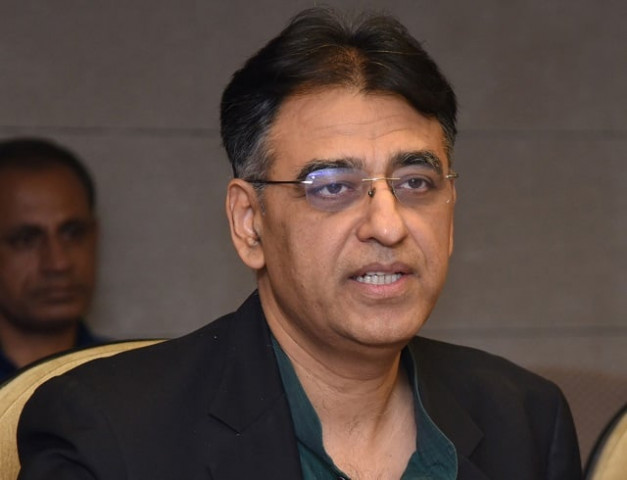Govt not to artificially control rupee value: Finance minister
Expert believes govt tacitly implementing IMF’s condition for total free float exchange rate

Finance Minister Asad Umar. PHOTO:AFP
But Umar insisted that Pakistan did not accept the IMF’s demand for a total free float exchange rate regime and 3.7% devaluation of the currency was not the result of the IMF conditionality. The total devaluation in the past 11 months has been 32.3% or Rs34, which will unleash an inflation tsunami.
Hours after local currency nosedived to Rs146 to a dollar before recovering to Rs139 in the interbank, Umar addressed a press conference and explained reasons behind the steep fall in intra-day trading. Planning Minister Khurso Bakhtiar and Minister of State for Revenue Hammad Azhar accompanied him.
Rupee’s fall should not panic anyone: PM Imran
“We cannot provide dollars indefinitely to support the value of the rupee,” said the finance minister while sharing his government’s policy on exchange rate. It was for the first time that the Finance Minister Umar spoke on the exchange rate policy.
The minister said there is a high demand for the dollar in the market but the supply is not matching it. Umar said there are two options, either to continue the old practice of artificially controlling the value of rupee or to devalue it.
“The currency devaluation appears to be the IMF’s prior action for approval of the bailout package,” said Dr Ashfaque Hasan Khan, a member of the Economic Advisory Council. He said along with the currency devaluation, the interest rates and the prices of electricity and gas could go up further before January.
“Pakistan will have to take all these actions, if it wants to get the bailout package approved by the IMF Executive Board in January,” said Dr Hasan.
Rupee closes at all-time low of 139.05 in inter-bank market
Pakistan and the IMF bailout talks ended on November 20 without reaching staff level agreement. But many saw it as a tacit understanding between both the parties, predicting that the IMF had given one and half month time to Pakistan implement prior actions.
Pakistan is seeking the bailout package to avoid default on international payments, as its current reserves are negative $4 billion after excluding short-term obligations.
“The rupee value cannot be controlled forever and our foreign exchange reserves have already slipped to $7 billion at one point,” the minister said.
Umar said even the Pakistan Muslim League-Nawaz (PML-N) government had abandoned the policy of fixed exchange rate and currency was significantly devalued during last seven months of its tenure.
During the bailout talks, the IMF had asked Pakistan to let the market forces decide fate of the rupee and go for a total free-float of the exchange rate.
It was view of some people of the IMF that Pakistan should adopt the free-float exchange rate regime, said Umar while responding to a question. He said despite adopting the policy of not supporting the value of the rupee, the government’s policy is still different than what the IMF was saying.
Umar said the rupee devaluation had nothing to do with the IMF conditions. “The IMF didn’t give us a target for the rupee devaluation, as the discussions were about the exchange rate system.
He said still there was intervention in the exchange rate to a certain extent. Pakistan artificially increased the value of rupee by providing dollars. As a result, people started importing vegetables and today the country is unable to export surplus sugar and wheat without providing subsidies, he said.
Umar said the gap between supply and demand of dollar will continue “till we address the root causes.” He said devaluation was result of a number of reasons, including $19 billion current account deficit in the last fiscal year, increased foreign loans, decreased foreign exchange reserves, low exports and artificial cap on the value of dollar.
The finance minister also noted the movement in the rupee value in the interbank market today (Frday), and said it appeared the dollar has settled at Rs139. Umar said that State Bank of Pakistan (SBP) determines the currency rate.
He blamed the previous government for the situation, saying rupee devaluation was imminent due to the flawed policies of the Pakistan Muslim League-Nawaz (PML-N) government. He, however, agreed that the devaluation is not a good thing, as it increases inflation.
“The devaluation coupled with other economic policies will produce positive results in the coming months. After 100 days of the PTI government the direction is clear now,” he added.
Talking on the occasion, Planning Minister Khurso Bakhtiar said Pakistan needs to move away from the consumption-led economic growth model and should focus on enhancing industrial base.
He said the PML-N’s dollar price management strategy promoted the consumption culture in the country and now 93% of the economic growth is consumption led compared with 59% in India.
He admitted that due to currency devaluation and other corrective measures the inflation rate would go up. He said it will take three to four years to correct the economic fundamentals.
Umar also announced that the government has decided to reduce petrol prices for the month of December and slashed prices of petrol and high-speed diesel (HSD) by Rs2 per litre each.



















COMMENTS
Comments are moderated and generally will be posted if they are on-topic and not abusive.
For more information, please see our Comments FAQ